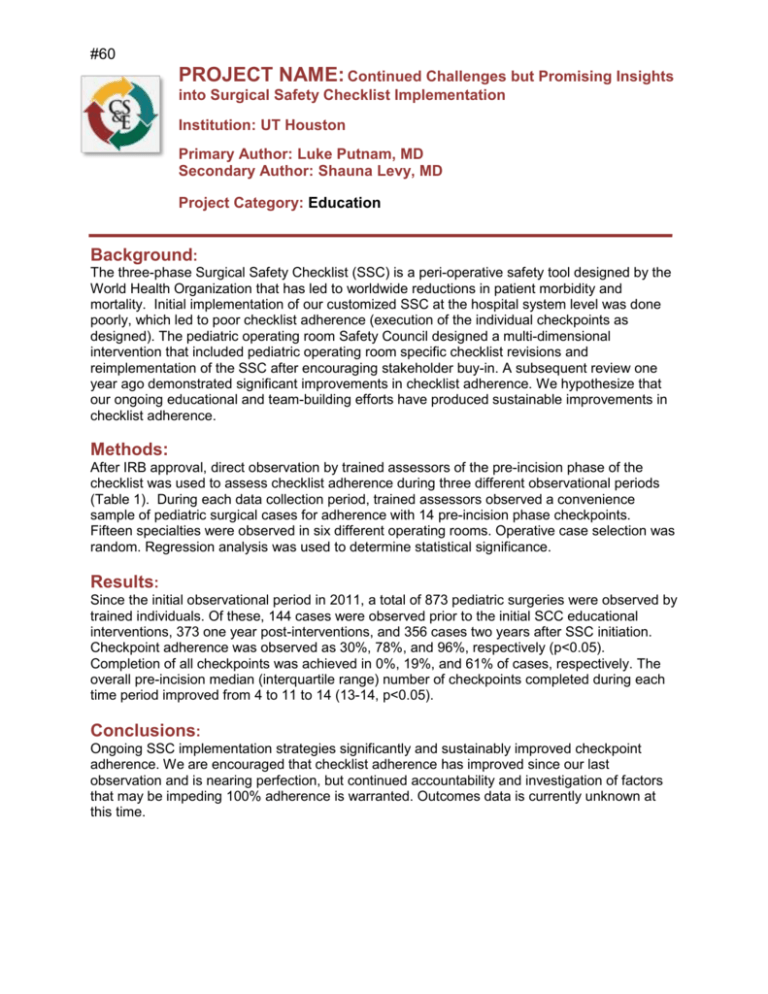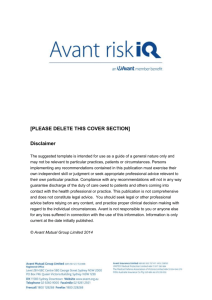DRAFT
advertisement

#60 PROJECT NAME: Continued Challenges but Promising Insights into Surgical Safety Checklist Implementation Institution: UT Houston Primary Author: Luke Putnam, MD Secondary Author: Shauna Levy, MD Project Category: Education Background: The three-phase Surgical Safety Checklist (SSC) is a peri-operative safety tool designed by the World Health Organization that has led to worldwide reductions in patient morbidity and mortality. Initial implementation of our customized SSC at the hospital system level was done poorly, which led to poor checklist adherence (execution of the individual checkpoints as designed). The pediatric operating room Safety Council designed a multi-dimensional intervention that included pediatric operating room specific checklist revisions and reimplementation of the SSC after encouraging stakeholder buy-in. A subsequent review one year ago demonstrated significant improvements in checklist adherence. We hypothesize that our ongoing educational and team-building efforts have produced sustainable improvements in checklist adherence. Methods: After IRB approval, direct observation by trained assessors of the pre-incision phase of the checklist was used to assess checklist adherence during three different observational periods (Table 1). During each data collection period, trained assessors observed a convenience sample of pediatric surgical cases for adherence with 14 pre-incision phase checkpoints. Fifteen specialties were observed in six different operating rooms. Operative case selection was random. Regression analysis was used to determine statistical significance. Results: Since the initial observational period in 2011, a total of 873 pediatric surgeries were observed by trained individuals. Of these, 144 cases were observed prior to the initial SCC educational interventions, 373 one year post-interventions, and 356 cases two years after SSC initiation. Checkpoint adherence was observed as 30%, 78%, and 96%, respectively (p<0.05). Completion of all checkpoints was achieved in 0%, 19%, and 61% of cases, respectively. The overall pre-incision median (interquartile range) number of checkpoints completed during each time period improved from 4 to 11 to 14 (13-14, p<0.05). Conclusions: Ongoing SSC implementation strategies significantly and sustainably improved checkpoint adherence. We are encouraged that checklist adherence has improved since our last observation and is nearing perfection, but continued accountability and investigation of factors that may be impeding 100% adherence is warranted. Outcomes data is currently unknown at this time. Table 1 2009 Checklist initiated at system level Observation 1 (July-Aug 2011) Intervention 1 (Aug 2011- July 2012) Observation 2 (July-August 2012) Intervention 2 (August 2012July 2013) Observation 3 (July-August 2013) Direct observation of the checklist - Safety Council - Safety lectures - Revised SSC Direct observation of the checklist - Audit/feedback - Continued safety lectures - Safety Council Direct observation of the checklist

![Assumptions Checklist [Word File]](http://s3.studylib.net/store/data/005860099_1-a66c5f4eb05ac40681dda51762a69619-300x300.png)


